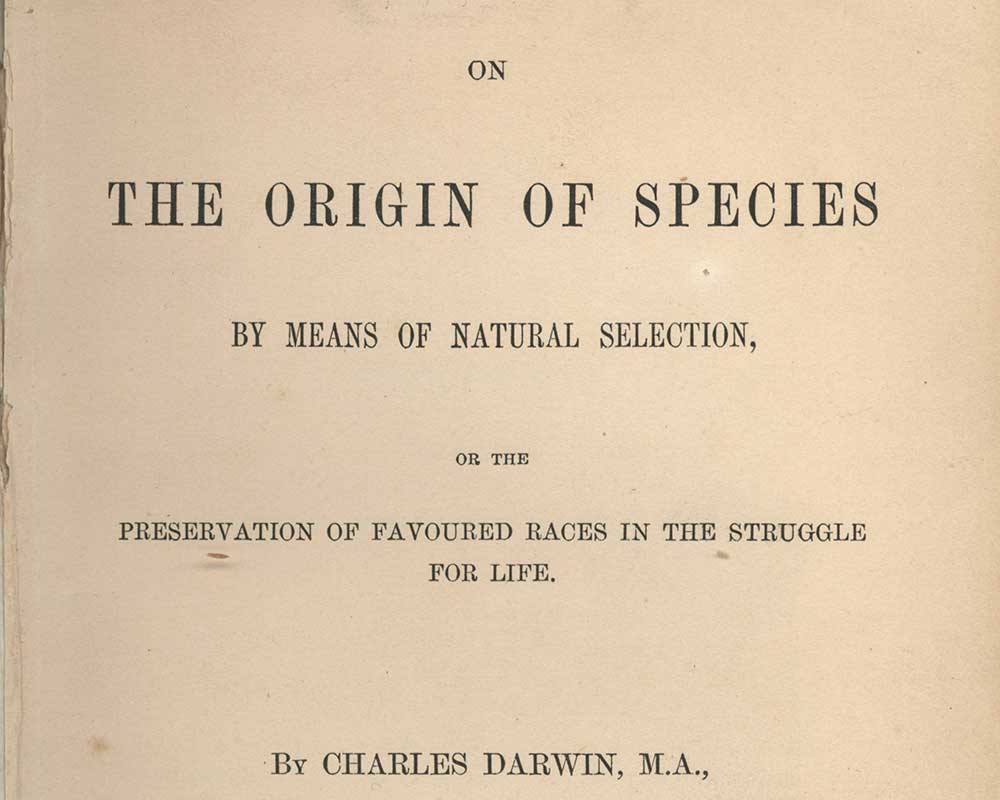November of this year sees the 150th anniversary of the publication of Charles Darwin's famous book, Origin of the Species. The beautifully simple idea embodied in his book - evolution by natural selection - was a revolutionary departure with profound scientific and philosophical implications.
Following the footsteps of Copernicus and Galileo three hundred years earlier, Darwin battered an enormous, irreparable breech in the walls of Fortress Theology and for that reason the book has been the source of intense debate right up to the present day. Darwin sought and found an explanation - a mechanism - for the evolutionary changes in species, which other scientists were beginning to suspect, using a purely materialist method, without any recourse to God or metaphysics.
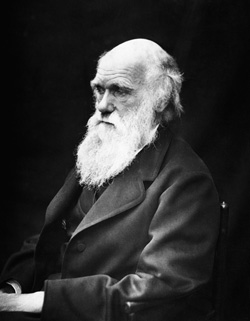
Because of its challenge to religious orthodoxy, Darwinian evolution is still dismissed today by millions of people who would otherwise scoff at outdated scientific ideas like a flat earth or the "phlogiston" theory of chemical oxidation:
"Gallop Polls conducted in the United States between 1982 and 2004, consistently found that between 44 and 47 per cent of Americans do not believe in evolution. Instead, they believe that humans were ‘created by God pretty much in their present form less than 10,000 years ago.'
Meanwhile, a recent survey of more than 400 university professors in Texas, a largely conservative state, found that nearly 90 percent believe modern evolutionary biology is largely correct."[1]
More alarming still was the survey conducted in Britain among science teachers last year, indicating that a sizeable minority (29 per cent) thought that creationism should be taught as a valid alternative to evolution! As Steve Jones, professor of genetics at University College London, put it, "Do these teachers believe that they should also teach the possibility that water is H3O, that Bacon wrote Shakespeare and that babies are brought by storks?"
In September last year, a day after the Church of England apologised for not having ‘understood' the ideas of Charles Darwin 150 years ago, the Catholic Church announced that it too was going to hold a five-day conference on the significance of Darwinism. There were, of course, howls of protest from anti-evolutionists who still interpret the Genesis book of the Bible as an exact and literal description of the history of the planet.
The Origin of Species
Darwin's starting point in Origin was the observation that within the population of a species there is a natural variation among its individual organisms. For example, birds of the same species are recognisable by the general feature that they have in common and which define the species, but each individual may have slightly different wing colour, beak length, weight and so on.
The same, of course, applies to humans: we are not identical copies or clones of our parents and with the exception of identical twins, all of us have genetic characteristics that are unique to us, even compared to parents and close siblings. We all share the general (species) characteristics of homo sapiens and we may resemble our parents, but in regard to the fine details, we are all unique.
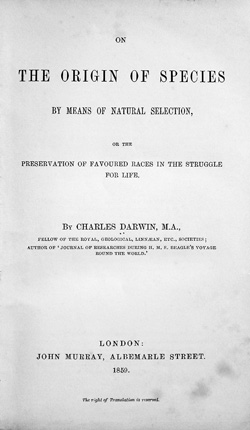
Darwin went on to note that apart from the general characteristics that go to make up the particular species, each individual would tend to pass on its own unique characteristics to the next generation. If, for example, two male pigeons with different wing length were to mate with similar females, the nestlings of the shorter-winged male would also tend to have shorter wings and the nestlings of the longer-winged male would tend to have longer wings.
As Darwin explained, humans have used the properties of natural variation and inheritance for generation. By artificially selecting which domestic animals would be allowed to breed, it has been possible to change - gradually, and generation by generation - the features of any given domestic animal population. Dogs, cats, cows, horses, pigeons, not to mention plants, have been "bred" to have certain useful features for millennia, precisely by selection of which organisms would be allowed to procreate.
In contrast to this artificial selection, Darwin posed the issue of natural selection. Whereas a farmer may decide which of his horses is allowed to breed, in the wild it is "nature" which determines which organism is more likely to reproduce, moreover, as a process effective over a far, far longer period of time. Darwin suggested that there was competition between organisms of the same species to see which one would be the most successful at breeding. In what Darwin called "the struggle for life", those organisms which had characteristics best suited to the environment in which they lived would be the most successful at reproduction, by surviving long enough to reproduce more often or more successfully.
"Owing to this struggle for life, any variation, however slight and from whatever cause proceeding, if it be in any degree profitable to an individual of any species, in its infinitely complex relations to other organic beings and to external nature, will tend to the preservation of that individual, and will generally be inherited by its offspring. The offspring, also, will thus have a better chance of surviving."[2]
Many characteristics may simultaneously be under environmental "pressure" to change - leg length, binocular vision, fur colour, digestive processes, disease-resistance, mating strategies, tail length, teeth size, shape and configuration, etc, etc. Thus a whole animal (or plant) evolves, in all its complex characteristics and features.
The idea of evolution by natural selection became ‘survival of the fittest' under the influence of Wallace, a collaborator, but was never a phrase embraced with any enthusiasm by Darwin himself. Wallace's phrase is suggestive of a population in constant conflict within itself, struggling selfishly so that only the strongest and fittest survive on merit. The formulation has been used ever since Darwin to ‘justify' racism and class society, with the implication that those who find themselves at the bottom of the social pile are somehow less ‘fit' and therefore less deserving than the powerful and wealthy at the top of society.
Darwin's Origin of Species used the expression natural selection, which is a simpler and more accurate description of the process in question. Having uncovered the mechanism of evolutionary change in the material conditions of living things, Darwin was able to explain "speciation", the formation of new species. He suggested that different parts of a species population may become physically isolated from one another - by mountain ranges or on different islands, for example - so that they experience different environmental pressures.
The science of geology was not well developed in Darwin's time, but we are well aware now of the movement of continents and the uplift of mountains to see how populations of plants and animals could potentially be split and subsequently isolated from each other. Darwin himself used the example of the different islands in the Galapagos to show how even on this relatively modest scale differences in environment produced different species of finches and tortoises.
Over time the different environmental pressures drive the evolution of the two populations in different directions so that they become physically distinct from each other. Eventually, as a Marxist would say (although, of course Darwin did not) quantity is transformed into quality and the differences become so great that two organisms from different parts of the population, should they come back into contact, would be unable to successfully interbreed - two separate species would then exist.
There are examples today of species that have clearly moved apart through evolution but are still close enough to breed - like tigers and lions or horses and donkeys. But they are already far enough apart for them to be unable to breed successfully - their offspring, ligers and mules, are sterile. In one fell swoop Darwin was able to explain, in terms of natural laws, how modern species had developed from earlier species and why there was such an enormous variety of species - we now know running into millions - on the planet.
It is surprising that Darwin's ideas are often misunderstood, even by other scientists (although not often those in the field of biology). The astronomer Fred Hoyle once famously remarked that accepting evolution was like believing that a "hurricane could blow through a junk-yard and accidentally assemble a jumbo jet". But what Fred Hoyle failed to appreciate was that it is the successive accumulation of ‘useful', small, incremental changes that leads to the formation of new species, not a single one-in-a-billion genetic mutation.
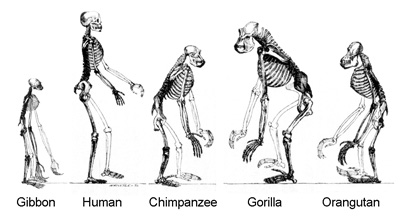
The most significant point about Darwin's simple idea was that the rise of species was based on the material conditions faced by organisms and that the evolutionary process was without aim or purpose. The most complex organic structures, like eyes, brains and other internal organs, not to mention the complex social structures we see in ants and bees, have all come into being as a result of the blind laws of natural science. Nature, as Richard Dawkins puts it, is a "blind watchmaker."
What was also important is that natural selection knocked human beings off their theological pedestal. Even where evolution was grudgingly accepted, it was assumed that it must reflect some purposeful progression to a ‘higher' and ‘higher' level, towards the ideal of Mankind. This idea, too, was brought to down to earth.
Darwinism, in short, was a huge blow to the Church and those scientists who held metaphysical notions of an evolution guided by the hand of God. Darwin's theory was enormously powerful in its beautiful simplicity and its undeniable foundation in solid facts and evidence.
Discoveries of the fossil remains of extinct organisms, alongside other evidence showing the great age of the earth - for example in the work of Charles Lyell - was already challenging any literal interpretation of the Genesis story of creation. But it would be a mistake to underestimate the challenge these ideas faced and the extent to which religion underpinned so much alleged ‘science' in Darwin's time.
The Church fought back in hundreds of works by scores of professors - mostly in works understandably forgotten today. Between 1833 and 1840, for example, a series of eight books were published "On the Power, Wisdom, and Goodness of God, as manifested in the Creation", each written by a leading authority in moral philosophy, natural history, astronomy, physiology, chemistry, and geology. The books were widely discussed, and extracts often appeared in sermons.
One of these, on geology, was written by William Buckland, professor of geology at Oxford. Its chapter headings included: "Proofs of design in the structure of fossil vertebrates", "Proofs of design in the structure of fossil vegetables", "Proofs of design in the effect of disturbing forces on the strata of the earth", and so on.
In one chapter, he discusses the fossil remains - some of which had been provided by Darwin from his Beagle voyage to Chile - of a Megatherium, an animal much like a giant sloth. On the basis of a reconstruction of its shape and physiognomy, Buckland concluded, Megatherium was no "monstrosity" as some anatomists had argued, but "evidence of God's wisdom and benevolence as a designer".
In the 1840s, another comparative anatomist, Richard Owen, argued in a series of publications that the animal kingdom was arranged according to four distinct organisational plans or types (fish, birds, reptiles, and mammals). These ‘archetypes', as he called them, were originally conceived in the mind of the Creator.
Another book, written by the geologist and Calvinist Hugh Miller, Footprints of the creator (1847), argued that evidence could be found in fossil formations of the biblical flood. And so on, this being a tiny sample of the theological ‘science' of the day.
Darwin's own ideas of religion
In his lifetime, Darwin couldn't completely break away from the Christian tradition in which he had been born and raised. Most of his friends, family and associates were part of the established Anglican Church and he supported the Church as a social institution. The Church, in any case, pervaded all aspects of academic life and association with it was often a condition of acceptance into teaching and research posts. Many of Darwin's own former teachers were linked in this way to the Church of England.
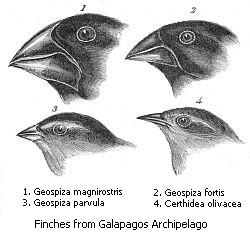
Darwin developed the main outline of his ideas many years before he came to publish them - as long as twenty years earlier - and one of the reasons for that was his difficulty in reconciling his ideas with established religion and philosophy. When he did come to publish Origin he left aside the question of human evolution in one enigmatic phrase: "light will be thrown on the origin of Man and his history." However, the implications were clear and twelve years later he published The Descent of Man, bringing natural selection into human development.
Nevertheless, his theories inevitably meant that his supporters frequently found themselves debating evolution with Church leaders and it is now clear from his papers that his scientific studies did have an influence on his private thoughts.
In his autobiography he wrote:
"The old argument from design in nature...which formerly seemed to me so conclusive, fails, now that the law of natural selection has been discovered. There seems to be no more design in the variability of organic beings and in the action of natural selection, than in the course which the wind blows."
On the existence of a ‘Creator' he wrote to Charles Lyell in September 1874:
"Many persons seem to make themselves quite easy about immortality and the existence of a personal God by intuition; and I suppose that I must differ from such persons, for I do not feel any innate conviction on any such points." [3]
Again, in a letter to F A McDermott, in November 1880, he wrote:
"I am sorry to have to inform you that I do not believe in the Bible as a divine revelation, and therefore not in Jesus Christ as the son of God."
Marx and Engels on Darwin
For the founders of dialectical materialism, the ideas of Darwin represented a brilliant confirmation of their world view. Darwin did not speak in the language of dialectical change, but his ideas certainly groped in that direction. But more importantly, the entire basis of Darwinism was rooted in a materialist viewpoint. In January 1861, Marx wrote to Engels:
"Darwin's book is very important and serves me as a natural scientific basis for the class struggle in history. One has to put up with the crude English method of development, of course. Despite all deficiencies, not only is the death-blow dealt here for the first time to ‘teleology' [the explanation of phenomena by their purpose - JP] in the natural sciences but its rational meaning is empirically explained."
Writing in Anti-Dűhring, Engels anticipated the further development of Darwin's ideas:
"The theory of evolution is however still in a very early stage, and it therefore cannot be doubted that further research will modify our present conceptions, including strictly Darwinian ones, of the process of the evolution of species."
Indeed, over the last 150 years since the publication of Origin, Darwin's ideas have not been refuted by science, but have been clarified, refined, quantified, deepened and developed by a vast accumulation of experimental evidence.
Darwin drew upon the geological work of Lyell which emphasised the almost unimaginably (for the day) old age of the Earth, against the opposition of the Church, which was created according to one learned bishop in 4004BC on a Tuesday afternoon. Darwin's Origin, following the same pattern as Lyell, placed the greatest emphasis on the gradual evolution of species over thousands of generations, putting the biological processes on the same time-scales as the geological. The emphasis was on slow, gradual change.
Even today, many Darwinists are gradualists, seeing evolution as a more or less slow and continuous development. Other ‘Neo-Darwinists' have refined the idea of speciation to embrace the possibility of rapid changes (rapid in geological terms, ie thousands rather than millions of years), interspersed with gradual change.
The so-called "punctuated equilibrium" model of Stephen Jay Gould and Niles Edredge is based on this idea of mass extinctions and mass speciation at key moments in biological history:
"...change does not usually occur by imperceptibly gradual alteration of entire species but rather by isolation of small populations and their geologically instantaneous transformation into new species." [4] (emphasis added)
There is indeed, ample evidence, for example, for an "explosion" in speciation at the beginning of the Cambrian era, 700 million years ago. Although the authors of this model don't use the expression, in fact it comes close to the idea of dialectical change described by Marx and Engels.
Many scientists now accept that there may be periods of relative equilibrium biologically, interspersed with rapid, sometimes catastrophic change. Some changes are ‘gradual' - like continental drift that moved enormous land masses across the surface of the earth. (Although tectonic plate movements are achieved by a long series of minor shocks and earthquakes, all of which, on a local scale, may be ‘catastrophic' to the environment.) Other changes, on a geological time-frame, may be sudden and dramatic. There is now some evidence that catastrophic volcanic activity or asteroid impact may have had dramatic impacts on biological processes on Earth.
The important point is that none of these ideas refute Darwinism, they merely add to it and develop it.
Mechanisms of evolution uncovered in molecular chemistry.
Darwin developed his theory from the careful observation and measurement of thousands of animal and plant species. He examined the principally the anatomy and to a degree the physiology of these living organisms. He himself wrote that "the laws governing inheritance are quite unknown..."[5] - he had no understanding of the physical mechanism underlying inheritance and evolution.
In the century and a half since he wrote these words, scientists have come to understand the underlying chemical mechanism of inheritance, through complex molecules like DNA and RNA. There is an entire body of knowledge that links the genetic make-up of all living organisms - the so-called genotype - to its physical expression as a living organism - the phenotype.
Giant molecules like DNA and RNA are now known to be the templates for protein synthesis in all living organisms and they have the capacity to carry ‘genetic code' by varying combinations of the four bases along the length of the molecular chain.
What dramatically underlines the Darwinian theory of evolution is that it is now clear that the fundamental genetic make-up of all living things on the planet - without exception - rely on the same basic biochemical mechanisms. In other words, the development of all modern molecular science has reinforced the fundamental ideas of natural selection put forward by Darwin 150 years ago.
The modern opponents of Darwinism - chiefly religious fundamentalists inspired by the book of Genesis - are not just rejecting evolution but are in fact rejecting all of modern biochemistry, which is itself drawn from the research and discoveries of millions of scientists, all over the globe, for the last 150 years. In fact, creationists - including the supporters of so-called Intelligent Design - if they were consistent, would have to reject all of modern science.
Darwinism has become one of the most important ‘isms' of our age. Despite the influence of religious fundamentalism, it is an idea accepted by the large majority of scientists today. It is an embedded part of our culture. A Google search on the internet gives 2.8 hits for Origin of the Species, 2.3 m hits for Darwinism and 15.2 million for natural selection!
Like the ideas of that other ‘ism' - socialism - it is rooted in material reality and it will therefore not go away. As the American philosopher Daniel Dennett has put it, "(Darwinism)...is securely tied by hundreds of thousands of threads of evidence anchoring it to virtually every other areas of human knowledge."[6] Darwin's theory remains today the ‘grand unifying theory' of biology.
It is entirely appropriate for Marxists to celebrate the work of Charles Darwin, in his impact possibly the most influential natural scientist of all time. Although his ideas were in this or that respect not fully rounded or developed they placed the entire science of biology on a solid materialist foundation for the first time and placed the biology of human development firmly within it.
Notes
[1] From The Earth Times Online Newspaper
[2] The Origin of Species, Pelican, p 115.
[3] See Darwin Correspondence Project
[4] Gould, 1992, quoted by Dennett.
[5] Origin of Species, Pelican, p 76
[6] Darwin's dangerous idea, Daniel C Dennett, Pelican.
